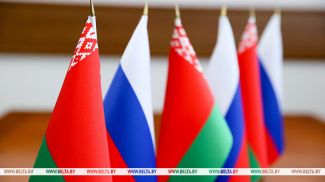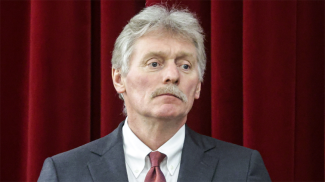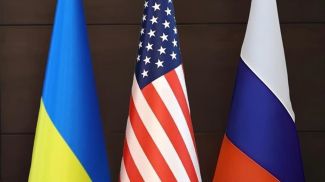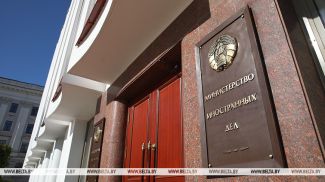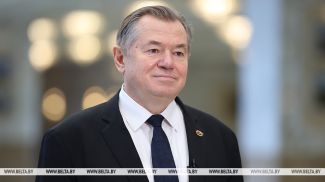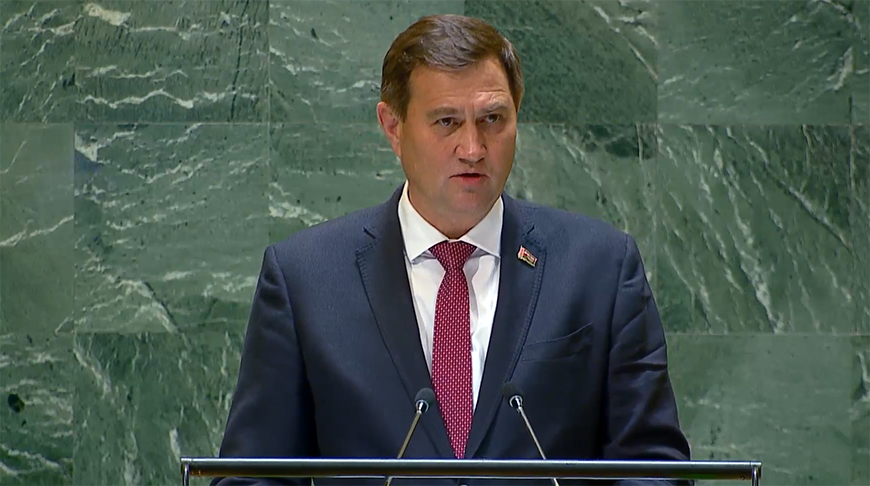
The Belarusian foreign minister addressed the General Debate, participated in meetings of the foreign ministers of the CSTO member states, the Ministerial Meeting of the Group of Friends of the UN Alliance of Civilizations, and the Ministerial Meeting of the Group of Friends in Defence of the UN Charter. Preliminary results suggest that the work of the Belarusian delegation was quite fruitful and effective.
Root causes of the erosion of the global security system
On 28 September, during the General Debate at the 79th Session of the UN General Assembly, Maksim Ryzhenkov named the main causes of the erosion of the global security system and the UN’s diminishing capacity to address the most acute conflicts and problems of humanity.
In this regard, he drew attention to the initiative of the Belarusian head of state to immediately embark on global security dialogue.
UN should free itself from the dictate of individual countries
The minister emphasized that the UN should free itself from the dictate of individual states that believe they have a free hand and are above everyone.
He noted that the Belarusian side insisted that the UN Security Council should be reformed to allow greater representation for large developing countries of Asia, Africa and Latin America.

The head of the Belarusian delegation called on the UN to support more actively regional processes, since regionalism is a key reality of today.
On destructive impact of illegal sanctions
Separately, Maksim Ryzhenkov called for meaningful and objective assessment by the Organization of the negative impact of sanctions on sustainable development.
Guterres on the prominent role of Belarus in the UN
The minister of foreign affairs of Belarus was received by UN Secretary-General Antonio Guterres. The parties discussed the international agenda, including global and regional security. Maksim Ryzhenkov urged to enhance the role of the UN in countering illegal unilateral coercive measures.

The secretary-general emphasized the active and meaningful role of Belarus in the UN and conveyed his warmest regards to the Belarusian head of state.
Negotiations of the CSTO foreign ministers
The CSTO foreign ministers held substantial negotiations upon the initiative of Kazakhstan.
The foreign ministers discussed the organization's activities, regional security, and upcoming high-level and top-level events within the CSTO.
Bilateral meetings
On the sidelines of the session, Maksim Ryzhenkov held separate bilateral meetings with a number of representatives of international organizations and foreign countries.
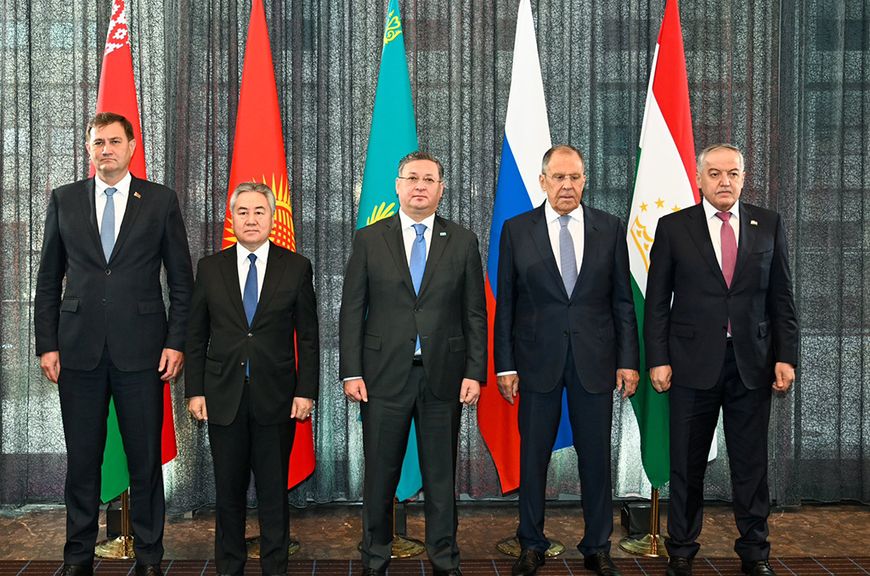
A constructive dialogue with President of the International Committee of the Red Cross Mirjana Spoljaric Egger took place at the UN headquarters. Ms Spoljaric reaffirmed the non-politicized nature of the organization's activities and put forward a number of humanitarian initiatives. Agreements were reached to continue and systematize bilateral cooperation.
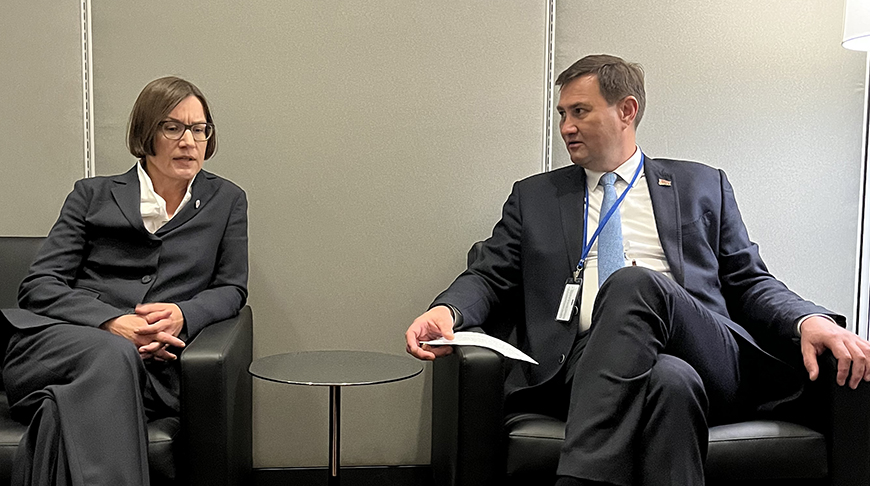 The meeting with the Secretary of State of the Holy See, Cardinal Pietro Parolin, focused on the pressing issues of Belarusian-Vatican interaction, the situation in the Eurasian region, and peacekeeping initiatives.
The meeting with the Secretary of State of the Holy See, Cardinal Pietro Parolin, focused on the pressing issues of Belarusian-Vatican interaction, the situation in the Eurasian region, and peacekeeping initiatives.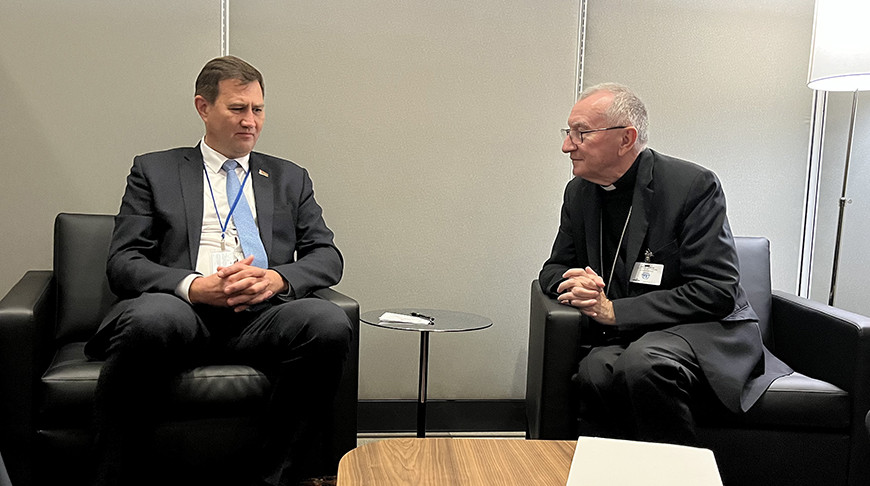 Talks were held with Russian Foreign Minister Sergey Lavrov and Kazakhstan’s Deputy Prime Minister and Minister of Foreign Affairs Murat Nurtleu.
Talks were held with Russian Foreign Minister Sergey Lavrov and Kazakhstan’s Deputy Prime Minister and Minister of Foreign Affairs Murat Nurtleu.Maksim Ryzhenkov and Sergey Lavrov discussed the subject of the upcoming Conference on Eurasian Security in Minsk on 31 October 2024 and the schedule of the nearest ministerial events between the two countries.
The meeting with Murat Nurtleu highlighted the progress in implementing the agreements following the recent intergovernmental consultations held in the Belarusian capital. The parties also clarified the schedule of bilateral events at various levels, and compared notes on the approaches within the framework of international organizations.
During the talks with Uzbekistan’s Foreign Minister Bakhtiyor Saidov, the main emphasis was placed on the most effective implementation of the roadmap of agreements between the heads of state, intensification of industrial cooperation, cooperation within the SCO and with third countries. Bilateral projects in non-sanctioned areas, the situation in Ukraine, energy, agriculture and sport were high on the agenda of a meeting with Hungarian Minister of Foreign Affairs and Foreign Trade Péter Szijjártó. Peter Szijjártó reiterated Hungary's fundamental position on the inadmissibility of discrimination against athletes on political grounds and the use of sport for political purposes. The parties also noted the similarity of positions on the counterproductiveness of illegal sanctions imposed by the West on a number of countries around the world.
Bilateral projects in non-sanctioned areas, the situation in Ukraine, energy, agriculture and sport were high on the agenda of a meeting with Hungarian Minister of Foreign Affairs and Foreign Trade Péter Szijjártó. Peter Szijjártó reiterated Hungary's fundamental position on the inadmissibility of discrimination against athletes on political grounds and the use of sport for political purposes. The parties also noted the similarity of positions on the counterproductiveness of illegal sanctions imposed by the West on a number of countries around the world.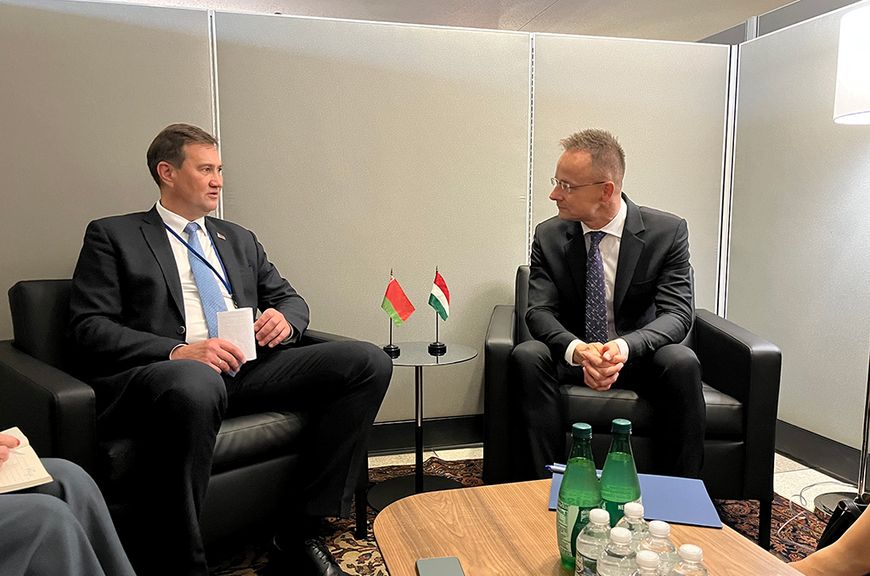 The meeting with Mohammed bin Abdulrahman Al-Thani, Prime Minister and Minister of Foreign Affairs of Qatar, was devoted to the prospects for humanitarian cooperation between the countries, including education, healthcare, and sport. The parties also touched upon cooperation on multilateral platforms, including BRICS and SCO.
The meeting with Mohammed bin Abdulrahman Al-Thani, Prime Minister and Minister of Foreign Affairs of Qatar, was devoted to the prospects for humanitarian cooperation between the countries, including education, healthcare, and sport. The parties also touched upon cooperation on multilateral platforms, including BRICS and SCO.
Ways of boosting bilateral trade, the schedule of bilateral visits, investment cooperation, and projects in high technologies headed the agenda of a meeting with Deputy Prime Minister and Minister of Foreign Affairs of Abdullah bin Zayed Al Nahyan of the United Arab Emirates.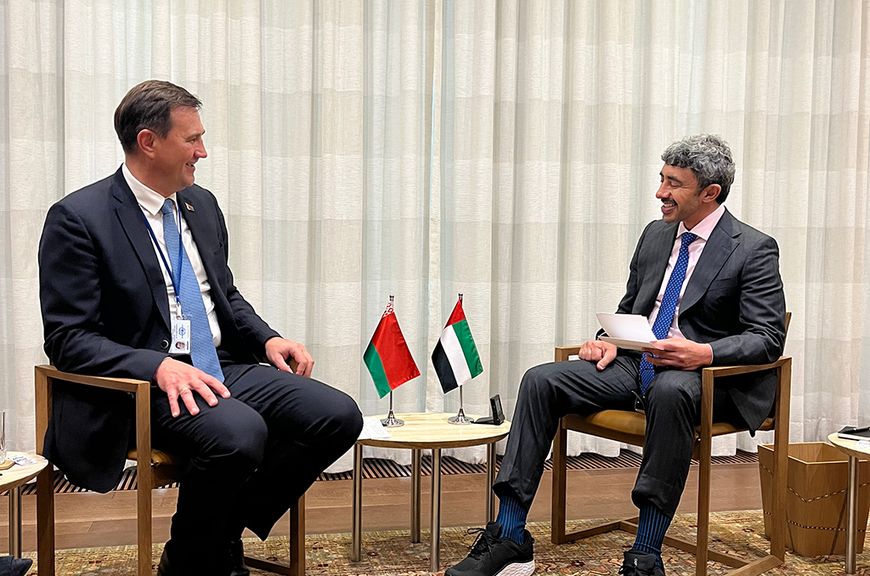 During the talks with Nicaragua's Foreign Minister Valdrack Jaentschke, the parties lauded the dynamic development of the historically friendly Belarusian-Nicaraguan relations, emphasized the similarities of positions on most international issues, and reaffirmed mutual support in international organizations. The parties discussed the status of the agreements reached following the visit of the Belarusian prime minister to Managua and new cooperation projects.
During the talks with Nicaragua's Foreign Minister Valdrack Jaentschke, the parties lauded the dynamic development of the historically friendly Belarusian-Nicaraguan relations, emphasized the similarities of positions on most international issues, and reaffirmed mutual support in international organizations. The parties discussed the status of the agreements reached following the visit of the Belarusian prime minister to Managua and new cooperation projects. A meeting with Indian Foreign Minister Subrahmanyam Jaishankar was devoted to the main issues on the Belarusian-Indian cooperation agenda. The parties discussed possible substantive steps and ways to revitalize the bilateral trade and economic interaction and also the schedule of events between the business communities of the two countries.
A meeting with Indian Foreign Minister Subrahmanyam Jaishankar was devoted to the main issues on the Belarusian-Indian cooperation agenda. The parties discussed possible substantive steps and ways to revitalize the bilateral trade and economic interaction and also the schedule of events between the business communities of the two countries.
The Belarusian delegation continued its talks with a meeting with Cuban Foreign Minister Bruno Rodríguez Parrilla to discuss the elements of the roadmap for bilateral cooperation and the international agenda, including the Ukrainian conflict. The parties reviewed the schedule of prospective meetings at various levels and touched upon BRICS and interaction in international organizations. The foreign ministers emphasized the two countries' shared position on the inadmissibility and illegality of unilateral coercive measures and their negative impact on the sustainable development of individual countries and regions.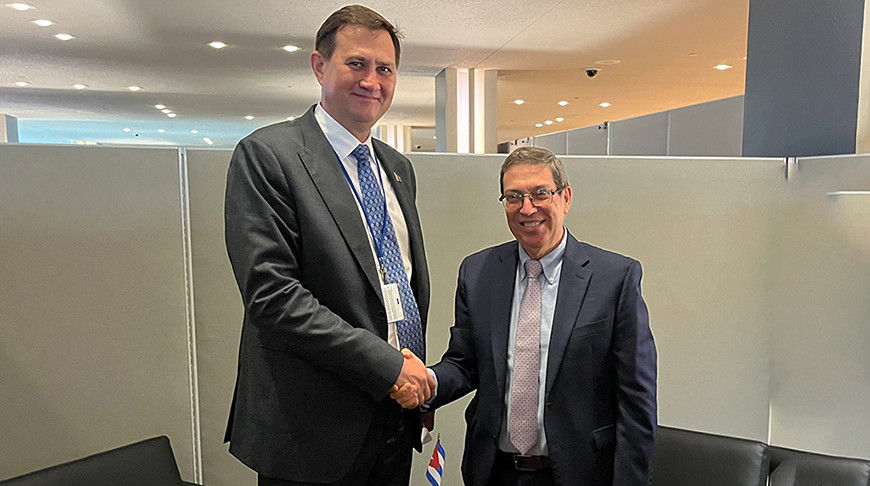
Maksim Ryzhenkov met with Bassam Sabbagh, Minister for Foreign Affairs and Expatriates of the Syrian Arab Republic to discuss projects to rebuild Syria's infrastructure and economy, inter-parliamentary cooperation, the situation in the Middle East and the world geopolitics in general. The parties also discussed rehabilitation programs for Syrian children in Belarus. According to Bassam Sabbagh, the rehabilitation program covered a total of 1,500 children. The minister expressed profound gratitude to the Belarusian president for the initiative. 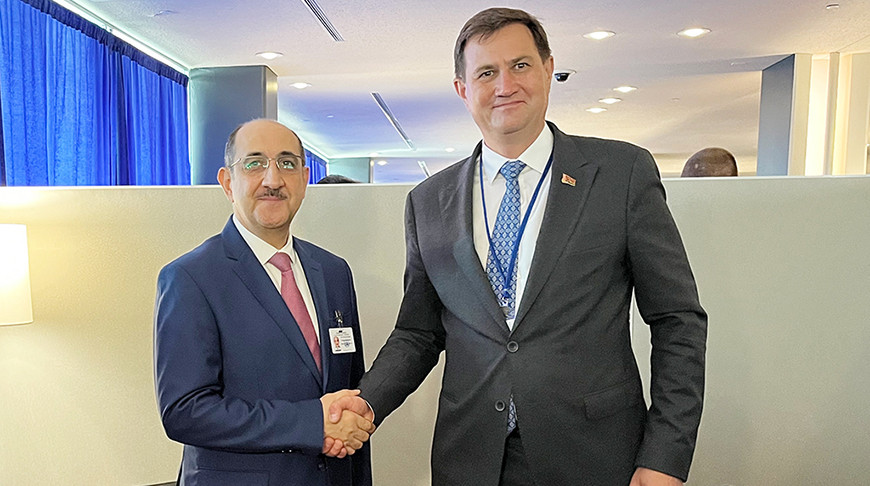
Maksim Ryzhenkov met with Yvan Gil Pinto, Minister of the People's Power for Foreign Affairs of the Bolivarian Republic of Venezuela to take stock of progress to implement the agreements following the visit of the Belarusian prime minister to Caracas, thrashed out plans to reinvigorate cooperation in the manufacturing industry, discussed BRICS-related topics, and joint efforts to counter attempts to put pressure and interfere in internal affairs. 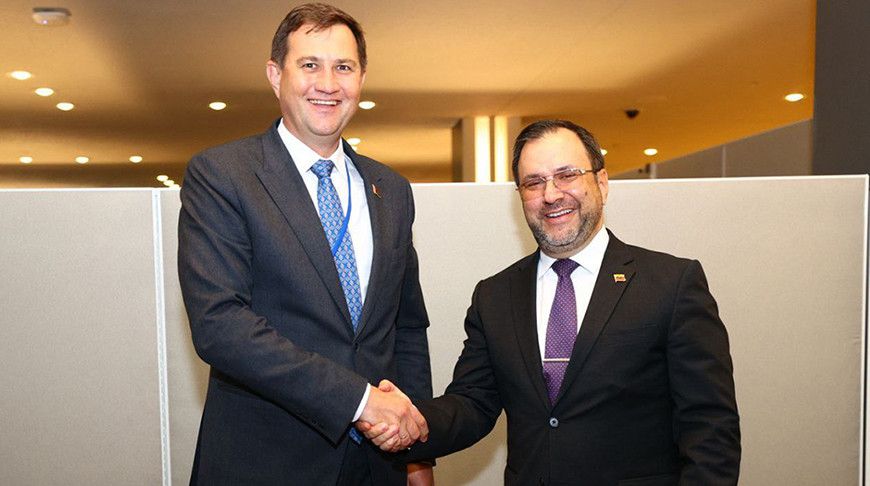
Maksim Ryzhenkov also held a meeting with Zimbabwe’s Minister of Foreign Affairs Frederick Shava on the sidelines of the General Assembly. The parties focused on the prospects of using the Belarusian-Zimbabwean potential to promote and develop cooperation with other countries of the African continent. The Zimbabwean counterpart expressed gratitude to Belarus for sending humanitarian aid to the northern regions of Zimbabwe to overcome the consequences of the unprecedented drought.
Maksim Ryzhenkov also held talks with Iranian Minister of Foreign Affairs Abbas Araghchi to discuss the roadmap for bilateral cooperation and issues of intensifying interaction between the Ministries of Foreign Affairs of the two countries. The parties reached agreements on a series of the nearest sectoral meetings in Minsk and Tehran. Iran reaffirmed its support for Belarus on the way to the country's partnership status in BRICS.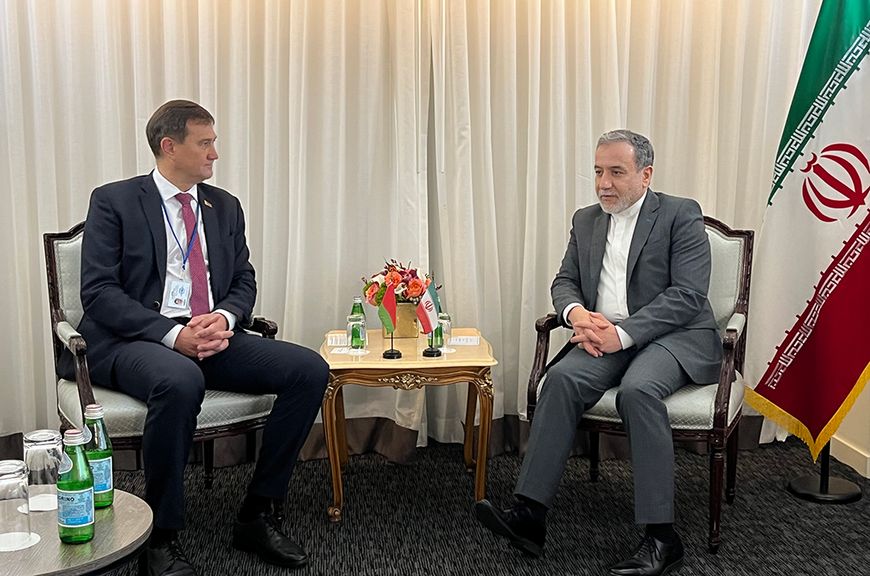
A number of high-level meetings are also on the agenda of the two countries.
The strategic nature of Belarus-Azerbaijan relations was highlighted at the meeting of Maksim Ryzhenkov with Minister of Foreign Affairs of Azerbaijan Jeyhun Bayramov on the sidelines of the UN General Assembly session in New York. The parties reviewed progress to implement the agreements reached by the heads of state during the Belarusian head of state’s visit to Azerbaijan in May 2024, and agreed to intensify and systematize the work as part of a number of areas. 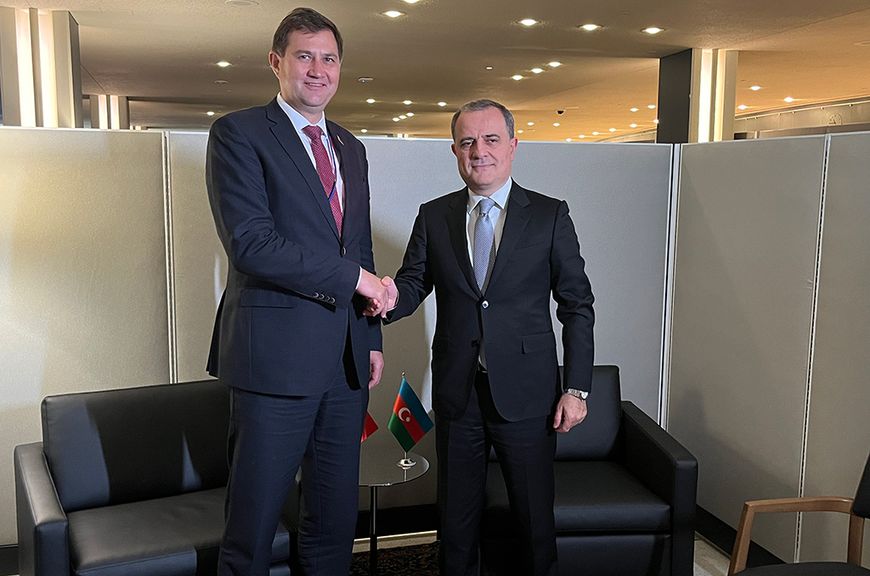
The parties dwelt in detail on the agenda of the upcoming high-level visits, interaction between the foreign ministries of the two countries, joint cooperation and infrastructure projects.
Belarus advocates the resumption of a broad international dialogue
Maksim Ryzhenkov also took part in the sixth ministerial meeting of the member countries of the Group of Friends in Defense of the UN Charter, where he voiced Belarus' position on the need to resume a broad international dialogue on the restoration of global security, and also the inadmissibility of the use of unilateral coercive measures in violation of the UN Charter.
During the meeting, the participants also discussed the latest developments in the Gaza Strip and the Middle East region as a whole, the conflict in Ukraine, various peacekeeping initiatives and their prospects.
A political declaration was adopted at the end of the event. The document will be published as an official document of the 79th session of the UNGA.
The Group of Friends is an informal association of like-minded states, created at the initiative of Venezuela in July 2021. The group consists of Algeria, Belarus, Bolivia, China, Cuba, North Korea, Equatorial Guinea, Eritrea, Iran, Laos, Mali, Nicaragua, Palestine, Russia, Saint Vincent and the Grenadines, Syria, Venezuela, and Zimbabwe. The objectives of the group include opposing unilateral coercive measures, defending the sovereignty and territorial integrity of member states in accordance with the principles of international law, and promoting joint initiatives aimed at protecting and strengthening the authority of the UN Charter.
The first ministerial meeting of the Group of Friends was held on the sidelines of the 76th session of the UN General Assembly in New York, USA on 23 September 2021. The second ministerial meeting was held on the sidelines of the 60th anniversary of the Non-Aligned Movement in Belgrade, Serbia on 12 October 2021. The third ministerial meeting was held during the High Level Week of the 77th Session of the UN General Assembly in New York, USA on 22 September 2022. The fourth ministerial meeting was held during the High Level Week of the 78th UN General Assembly in New York, USA on 22 September 2023. The fifth ministerial meeting was held on the sidelines of the 19th Summit of Heads of State and Heads of Government of the Non-Aligned Movement in Kampala, Uganda on 18 January 2024. The meetings resulted in the adoption of political declarations.
Group of Friends of the UN Alliance of Civilizations
Belarusian Minister of Foreign Affairs Maksim Ryzhenkov participated in the ministerial meeting of the Group of Friends of the UN Alliance of Civilizations chaired by UN Under-Secretary-General, High Representative for the Alliance of Civilizations, former Minister of Foreign Affairs of Spain Miguel Moratinos.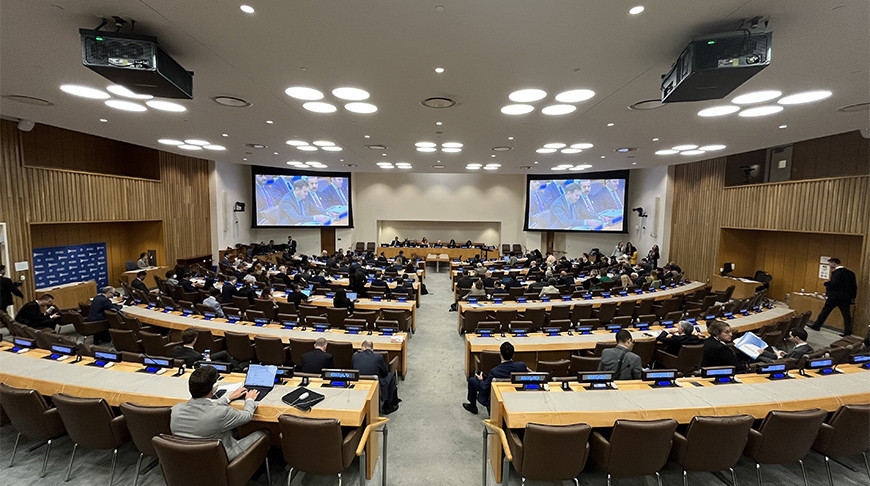
The Alliance of Civilizations is an international organization founded in 2005 as the initiative of former UN Secretary-General Kofi Annan with the support of the governments of Spain and Türkiye. The aim of the organizations is to promote inter-ethnic, inter-cultural and inter-religious dialogue. The Group of Friends of the Alliance of Civilizations consists of 160 members (130 UN member states, Palestine and 29 international organizations). The Alliance of Civilizations works in five areas: education, youth, media, migration and gender equality.
Ryzhenkov expressed support for UN Alliance of Civilizations
Belarus is home to 156 nationalities and 25 confessions, and the Belarusian society has never faced any disagreements based on racial, national and religious enmity, the minister said as he addressed the UN General Assembly. One of the pillars of Belarusian society is the respect for all nationalities, religions and languages without any discrimination.
Maksim Ryzhenkov expressed support for the Alliance's efforts to involve youth, who should play a creative role and assist governments in shaping the national policy of the future, in the decision-making process.
The minister noted that Belarus views migration as a phenomenon able to make a positive contribution to the development of any society through culture, knowledge, customs and traditions. He pointed out the increasingly politicized nature of this matter and called to address any controversial issues through dialogue.
Emphasizing the important role of the media in educating and promoting sustainable progress, Maksim Ryzhenkov urged the Alliance of Civilizations to step up the fight against hate speech and misinformation.




